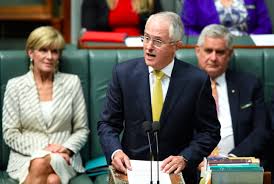
(9News AU) Canberra -Prime Minister Malcolm Turnbull has announced a plan to heavily target ISIS, and has warned that Australians could fall victim to deadly terrorism attacks in south-east Asia as networks of extremists are galvanised and attracting new recruits.
Mr Turnbull announced a planned change to the Australian Defence Force’s (ADF) rules of engagement in Iraq, which would bring air strike policies in line with international law and allow them to be more frequent and easier to approve.
Mr Turnbull said proposed changes would help the ADF to “target Daesh at its core”.
“I can announce that the government has reviewed it policy on targeting enemy combatants, and earlier this year made an important decision to ensure our forces are empowered to act against Daesh in Syria to the maximum extent allowed by international law, and we will move quickly to introduce the necessary amendments to the Commonwealth Criminal Code that will bring our domestic laws into line with international norms,” he said.
“This means that ADF personnel will be supported by our domestic laws, they will be able to target Daesh at its core, joining with our coalition partners to target and kill a broader range of Daesh combatants, which is consistent with international law.”
“Indonesia, Malaysia, the Philippines and Bangladesh have suffered terrorist attacks over the past year. Many are expecting further attacks,” he told parliament this morning.
But Australian politicians should also not close their eyes to the threat of “lone wolf” attacks on home soil, Mr Turnbull said, adding he would soon receive a report on how best to thwart such attacks.
He said ISIS were sending extremists to countries to carry out attacks and were also attempting to recruit and radicalise people with no prior associations.
The death of attackers who had carried out the Martin Place siege, the Endeavour Hills stabbing and the murder of police official Curtis Cheng did not lessen local threats, Mr Turnbull said.
“There are still people outside our country, and some within it, who hate the freedoms that we enjoy and would seek to threaten them and undermine them with violence,” he said.
“Some of these lone-actors and small groups are not deeply engaged with the Islamist ideology but are nonetheless, due to a range of reasons, including mental illness, susceptible to being radicalised rapidly.”
The federal government has reassured Australia’s regional neighbours that it will work with them to strengthen co-operation and mitigate risks, Mr Turnbull said.
Later this month, the government plans to bring to parliament new draft laws to keep high-risk terrorists in jail after their sentence ends and a stronger control-order regime.
Mr Turnbull said these steps would strengthen Australia’s counter-terrorism laws.
“They are also proportionate – balancing the need to keep the community safe with concerns for privacy and individual rights,” he said.
Legislation imposing harsher penalties for trafficking illegal firearms will also go to parliament in the next sitting week.